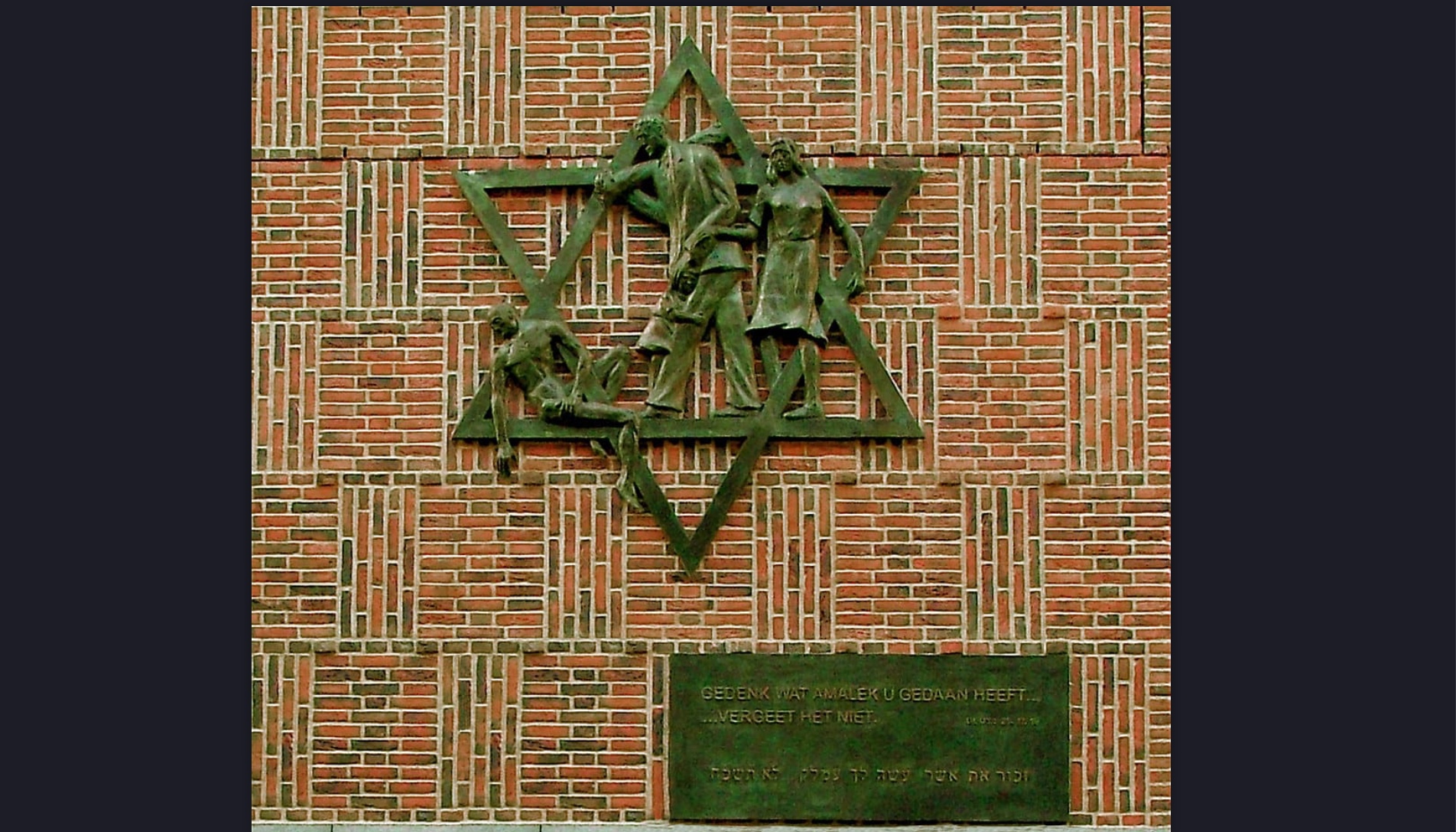Netanyahu rejects South Africa’s claim that his quote about ‘Amalek’ was a call to genocide
South Africa showed a “deep historical ignorance” in misattributing how the Israeli prime minister referred to Amalek, his office said

A memorial to Dutch Jews murdered in the Holocaust in an undated photo, The Hague, Netherlands.The phrase “Remember what Amalek has done to you” is inscribed on the plaque. (The Hague Municipality)
(JTA) — Israeli Prime Minister Benjamin Netanyahu rejected claims that his comments invoking Amalek, an enemy people of the ancient Israelites, suggested genocidal intent in Israel’s war on Hamas.
South Africa quoted Netanyahu and other Israelis officials in bringing genocide charges against Israel at the International Court this month. In particular, its charging document singled out Netanyahu for his statement as Israel prepared its ground invasion on Oct. 23.
“The Prime Minister invoked the Biblical story of the total destruction of Amalek by the Israelites, stating: ‘you must remember what Amalek has done to you, says our Holy Bible. And we do remember’,” the charging document said. It also quotes I Samuel 15, in which King Saul is instructed to “spare no one” in attacking Amalek.
Netanyahu’s office said Tuesday that the charge was one of a number of “absurdities” aired at initial hearings last week at the International Court of Justice at The Hague. “This false and preposterous charge reflects a deep historical ignorance,” it said in a statement.
“The Amalekites mercilessly attacked the Children of Israel after the Exodus from Egypt,” the statement said. “The comparison to Amalek has been used throughout the ages to designate those who seek to eradicate the Jewish people, most recently the Nazis.”
The statement from Netanyahu’s office noted that the phrase “Remember what Amalek has done to you” appears at Israel’s Yad Vashem Holocaust memorial and is inscribed on a memorial to Dutch Jews murdered during the Holocaust at The Hague, where the court sits. “Obviously neither reference is an incitement to genocide of the German people,” the statement said.
Malcolm Shaw, the British barrister who leads the team defending Israel at The Hague, noted during last week’s testimony that Netanyahu makes clear in the fuller quotation that he is identifying Amalek with Hamas, not with Palestinians generally. “We are now entering the second phase of the war, which its objectives are clear: destruction of the military and governmental capabilities of Hamas and the return of the hostages back home,” Netanyahu said. “In the last couple of days, I have met with our soldiers in the bases, in the field, in the north and in the south. Remember what Amalek has done to you. We remember, and we are fighting.”
“There is no need here for a theological discussion on the meaning of Amalek in Judaism, which was indeed not understood by the Applicant,” Shaw said.
The South African charging document also misattributed the source of Netanyahu’s quote, inaccurately suggesting he was referring to I Samuel 15. Netanyahu, however, did not quote that passage; instead, “Remember what Amalek has done to you” is from Deuteronomy 25, and refers to how God saved the Israelites from the peril posed by the Amalekites. In the context of Deuteronomy, the phrase appears among a litany of commandments and is seen by Jewish scholars as a commandment to remember that God is with the Jews even in times of peril.
“Remember what Amalek did to you on your journey, after you left Egypt,” the passage reads, “how, undeterred by fear of God, he surprised you on the march, when you were famished and weary, and cut down all the stragglers in your rear. Therefore, when your God grants you safety from all your enemies around you, in the land that your God is giving you as a hereditary portion, you shall blot out the memory of Amalek from under heaven. Do not forget!”
The phrase as it appears in Deuteronomy has repeatedly been used since the Holocaust as a call to witness; Yad Vashem features the phrase on a banner, and its archives include letters between European Jews during the Holocaust in which they plead with one another to bear witness should they survive. Later commentators said the calls to spare no Amalekites or to blot out their memory were to be understood metaphorically, not literally.
Netanyahu’s appeal came weeks after Hamas terrorists invaded Israel on Oct. 7, murdering more than 1,200 people and brutalizing thousands more. Since Israel launched counterstrikes on Oct. 8, more than 23,000 Palestinians have been killed, including thousands of children, spurring the genocide charges. Israel says a third of the dead are combatants.
This article originally appeared on JTA.org.





















